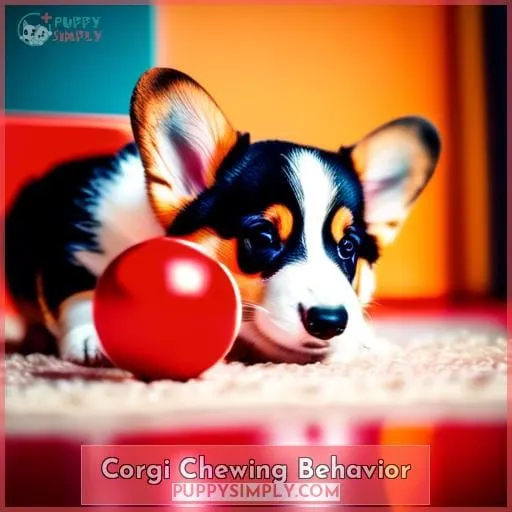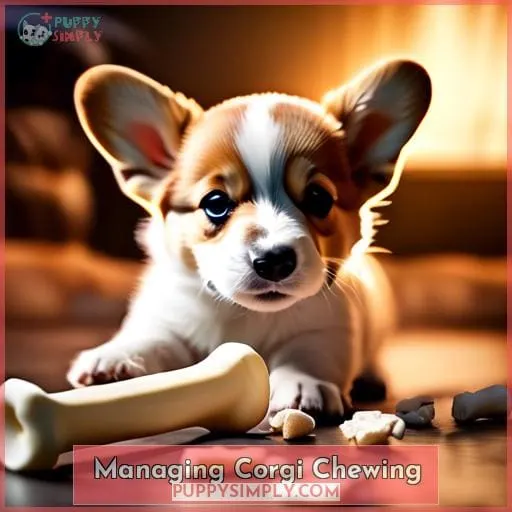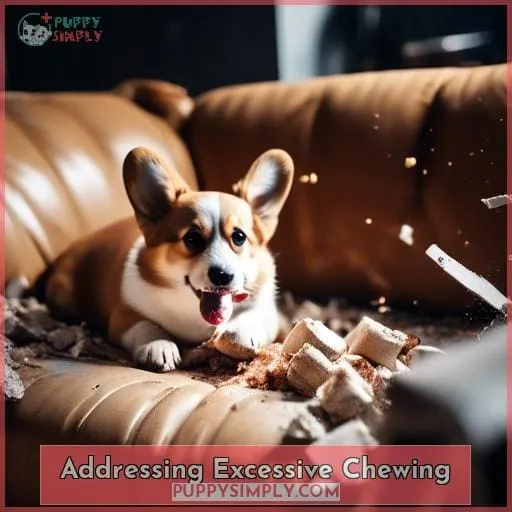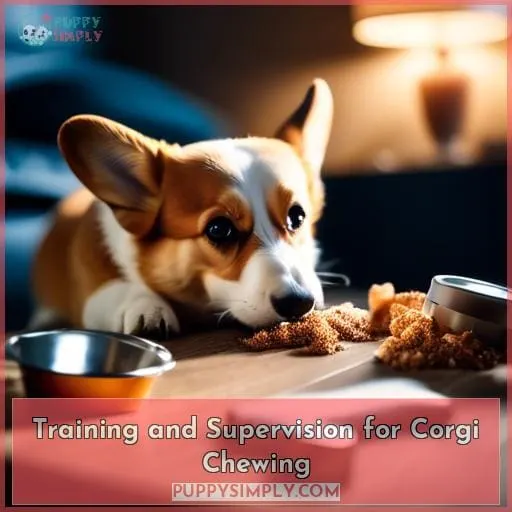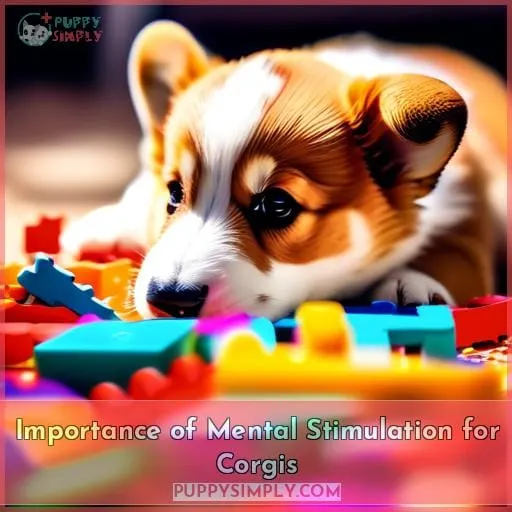This site is supported by our readers. We may earn a commission, at no cost to you, if you purchase through links.
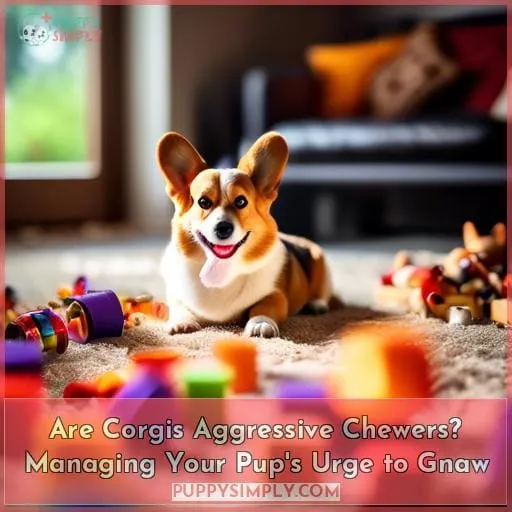
From redirecting excessive chewing to providing mental stimulation, you’ll find actionable tips to keep your Corgi content and your belongings intact.
Join us as we delve into the delightful yet chew-happy world of these lovable canines.
Yes, Corgis are known to be big chewers, requiring proper training and suitable chew toys to manage their chewing behavior effectively. Implementing consistent training and providing appropriate outlets for chewing can help curb this natural behavior in Corgis.
Table Of Contents
- Key Takeaways
- Corgi Chewing Behavior
- Managing Corgi Chewing
- Addressing Excessive Chewing
- Training and Supervision for Corgi Chewing
- Importance of Mental Stimulation for Corgis
- Frequently Asked Questions (FAQs)
- How can different environmental factors influence a Corgi’s chewing behavior?
- Are there specific techniques to introduce new chew toys to a Corgi effectively?
- What role does age play in determining a Corgi’s chewing habits and preferences?
- Can certain scents or flavors in chew toys impact a Corgi’s interest and engagement?
- Are there any innovative technologies or advancements in chew toys designed specifically for Corgis?
- Conclusion
Key Takeaways
- Corgis have a natural chewing behavior for dental health and mental stimulation.
- Providing breed-specific toys can satisfy their chewing urge and promote overall well-being.
- Understanding and addressing excessive chewing requires identifying potential causes like boredom, anxiety, or nutritional deficiencies.
- Training, supervision, and offering a variety of durable toys are essential for managing corgi chewing habits effectively.
Corgi Chewing Behavior
When it comes to Corgi chewing behavior, understanding their natural instincts and tendencies is key to effectively managing their habits.
Corgis, being a breed with specific toy preferences, exhibit natural chewing behavior that serves various purposes beyond just play. This behavior is essential for their dental health, mental stimulation, and channeling their abundant energy in a positive way.
Providing Corgis with breed-specific toys designed for safe chewing options not only satisfies their innate urge to chew but also promotes overall well-being.
By incorporating corgi training techniques and offering appropriate toys, you can help redirect their chewing instincts towards suitable items, ensuring a happy and healthy environment for both you and your furry companion.
Managing Corgi Chewing
To effectively manage your Corgi’s chewing behavior, focus on providing appropriate chew toys and implementing consistent training techniques.
Understanding your Corgi’s chewing habits and triggers is key to solving chewing problems and preventing furniture damage. For aggressive chewers, consider durable options like Kongs, puzzle toys, treat-dispensing toys, and enrichment toys to promote healthy chewing habits.
Rotate toys regularly to maintain interest and offer mental stimulation. Supervise your Corgi during playtime to ensure safe chewing practices.
By offering a variety of engaging chew toys and rewarding positive chewing behavior, you can redirect their energy towards constructive activities and prevent destructive chewing tendencies.
Addressing Excessive Chewing
If your Corgi displays excessive chewing behavior, it’s crucial to identify potential causes such as teething, boredom, anxiety, or nutritional deficiencies.
Implementing strategies to redirect their chewing towards appropriate objects, providing a variety of chew toys, and supervising their playtime can help manage and address this behavior effectively.
By understanding the reasons behind excessive chewing and taking proactive steps, you can promote a healthier chewing habit for your Corgi.
Identifying Potential Causes of Excessive Chewing
To address excessive chewing in Corgis, it’s crucial to pinpoint the underlying causes triggering this behavior.
- Separation anxiety
- Teething problems
- Nutritional deficiencies
- Boredom
- Attention-seeking behavior
Strategies to Redirect Chewing Behavior
If your Corgi is displaying excessive chewing behavior, consider implementing redirection strategies to address this issue effectively. Utilize interactive toys like snuffle mats for mental stimulation. Incorporate taste deterrents and the fingernail test to discourage inappropriate chewing.
Crate training can help manage behavior, while giving commands and offering long-lasting chews like bully sticks can redirect their focus positively.
| Strategy | Description |
|---|---|
| Interactive Toys | Engage Corgis mentally with snuffle mats for stimulation and distraction. |
| Taste Deterrents | Use products to discourage chewing on inappropriate items effectively. |
| Crate Training | Implement crate training to manage behavior and provide a safe space. |
Training and Supervision for Corgi Chewing
Ensure consistent training and vigilant supervision to effectively manage your Corgi’s chewing behavior. Teaching commands like leave it and drop it can help redirect their focus from inappropriate items to approved toys.
Establish clear boundaries by providing designated chew toys and rewarding positive chewing behavior. Supervision is key to intervene promptly if your Corgi starts chewing on forbidden objects. Use positive reinforcement techniques to encourage proper chewing habits and discourage destructive behavior.
Engage in interactive play sessions to keep your Corgi mentally stimulated and physically active, reducing the likelihood of excessive chewing. Remember, patience and consistency in training and supervision are essential for shaping your Corgi’s chewing behavior positively.
Importance of Mental Stimulation for Corgis
Engage your Corgi’s mind with stimulating activities to promote their overall well-being and prevent boredom-induced behaviors. Mental stimulation is crucial for Corgis to maintain good mental health, reduce anxiety, and prevent attention-seeking behaviors.
Daily exercise and engaging enrichment activities play a significant role in keeping your Corgi happy and mentally sharp. Consider incorporating puzzle toys, interactive games, sniffing mats, and training sessions to challenge their cognitive abilities.
Providing a variety of mental stimulation opportunities not only satisfies their natural instincts but also helps curb excessive chewing behavior by redirecting their focus onto positive activities.
- Puzzle toys for cognitive challenges
- Interactive games for engagement
- Sniffing mats for sensory stimulation
- Training sessions for mental focus
- Variety of activities to prevent boredom
Frequently Asked Questions (FAQs)
How can different environmental factors influence a Corgi’s chewing behavior?
Different environmental factors like boredom, stress, teething, and lack of mental stimulation can influence a Corgi’s chewing behavior.
Providing appropriate toys, exercise, and attention can help redirect and manage their chewing habits effectively.
Are there specific techniques to introduce new chew toys to a Corgi effectively?
Introducing new chew toys to your Corgi? Start slow, like dipping toes in water.
Offer variety, observe preferences, and use tasty incentives.
Rotate toys for freshness.
What role does age play in determining a Corgi’s chewing habits and preferences?
Age significantly influences a Corgi’s chewing habits and preferences.
Younger Corgis may chew more due to teething or excess energy.
Older ones might prefer softer toys.
Understanding age-related needs helps tailor chew options for optimal satisfaction.
Can certain scents or flavors in chew toys impact a Corgi’s interest and engagement?
Infusing chew toys with enticing scents or flavors can captivate your Corgi’s attention and enhance engagement.
Stimulating their senses with appealing aromas encourages active play, creating a delightful and interactive experience.
Are there any innovative technologies or advancements in chew toys designed specifically for Corgis?
Innovative chew toys for Corgis incorporate interactive features like treat dispensing, puzzle elements, and durable materials to engage their intelligence and energy.
Look for toys that challenge and entertain your Corgi’s natural instincts for a rewarding playtime experience.
Conclusion
To wrap up our exploration into the world of Corgis and their chewing tendencies, remember that Corgis are indeed big chewers. By implementing consistent training, providing suitable chew toys, and offering ample mental stimulation, you can effectively manage their chewing behavior.
Addressing excessive chewing through redirection strategies and supervision is key to keeping your Corgi content and your belongings intact. Embrace these tips to create a harmonious environment for both you and your chew-happy Corgi companion.

